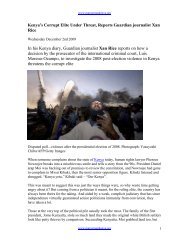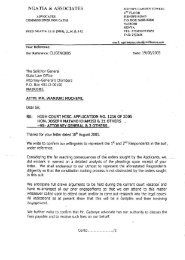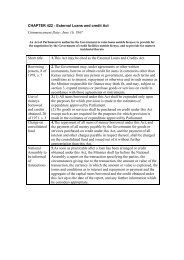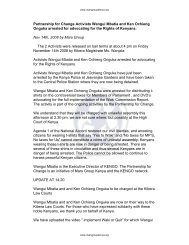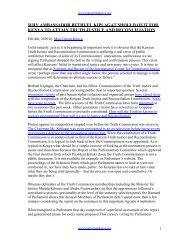Navy story.indd - Mars Group Kenya Publications
Navy story.indd - Mars Group Kenya Publications
Navy story.indd - Mars Group Kenya Publications
You also want an ePaper? Increase the reach of your titles
YUMPU automatically turns print PDFs into web optimized ePapers that Google loves.
côte d’ivoire<br />
Diamonds, gold and guns<br />
Both sides in the divided country exploit the underground economy<br />
to pay for fresh weapons<br />
Another round of regional<br />
negotiations has failed, a<br />
credible election is impossible<br />
by the deadline of 31 October and<br />
the international and regional<br />
organisations look increasingly<br />
ineffectual. The Economic Community<br />
of West African States (ECOWAS) has<br />
endorsed an extension of President<br />
Laurent Gbagbo’s time in office by<br />
another year and nothing useful is<br />
expected from the African Union’s<br />
crisis meeting on Côte d’Ivoire which<br />
started on 17 October.<br />
The United Nations has been<br />
sharply criticised by its own panel of<br />
experts for failing to monitor the arms<br />
embargo it imposed after Gbagbo’s<br />
forces tried to re-launch the war<br />
against northern-based rebels two<br />
years ago. The experts’ report says the<br />
UN’s monitoring failures are allowing<br />
Gbagbo’s side to rebuild its air force,<br />
which was almost totally destroyed<br />
by France’s Licorne force in November<br />
2004, after nine French soldiers were<br />
killed when Ivorian Sukhoi bombers<br />
raided rebel positions.<br />
The UN panel is headed by Atabou<br />
Bodian of Senegal, a civil aviation<br />
specialist; Alex Vines, a British<br />
weapons expert who runs the Africa<br />
programme at London’s Chatham<br />
House; and Jean-Pierre Witty, a<br />
Canadian customs expert. It has<br />
reported on test flights of a Mig-24<br />
attack helicopter like the one used in<br />
several massacres during the 2002-<br />
2003 fighting, its nose decorated to<br />
look like a khaki-coloured shark. In<br />
February 2005, the UN Operation<br />
for Côte d’Ivoire (ONUCI) gave<br />
permission to test its systems once<br />
a month, on the ground – against<br />
the advice of the UN’s Department<br />
of Peacekeeping Operations and the<br />
Sanctions Committee on Côte d’Ivoire.<br />
In July 2005, when the helicopter was<br />
prepared for take-off to repel an alleged<br />
rebel attack on Anyama, near Abidjan,<br />
the Licorne commander, General Elrick<br />
Irastorza, telephoned Ivorian Chiefof-Staff<br />
Philippe Mangou to warn him<br />
that France would consider use of the<br />
aircraft a hostile act.<br />
Eastern European technicians look<br />
after both the Mig-24 and at least<br />
one Antonov AN-12 troop-carrier<br />
supplied by a Belarussian stateowned<br />
company, Belspetsv Technika<br />
(BSVT) via a company owned by<br />
Robert Montoya, a French citizen and<br />
former leading member of ex-President<br />
François Mitterrand’s Cellule<br />
Antiterroriste. The UN’s Peacekeeping<br />
Department has said that the use of<br />
foreign technical experts to repair<br />
military aircraft would breach the<br />
arms embargo. Last year, ONUCI<br />
discovered that tyres for the AN-12 had<br />
been flown in by Ethiopian Airlines.<br />
The Ivorian authorities obstruct<br />
ONUCI, whose inspectors have<br />
been refused permission to search<br />
the hangar where the helicopter is<br />
kept and have called off at least one<br />
inspection due to threats. The panel<br />
notes that ONUCI must give at least six<br />
hours’ notice for almost all inspections,<br />
which are refused for Gbagbo’s home<br />
area of Gagnoa and for key units of the<br />
presidential guard and gendarmerie.<br />
Gold production is set to rise as<br />
the exploration phase moves into<br />
production. The only operational<br />
commercial mine is in the west,<br />
which produced 41,000 ounces in<br />
2005. South Africa’s Randgold is<br />
diamond dollars<br />
exploring with the blessing of the rebel<br />
leadership at its Tongon site (believed<br />
to hold the largest gold reserves) and<br />
Australia’s Equigold is exploring at<br />
Bonikro in the south, targeting output<br />
there of 130,000 to 150,000 ounces<br />
a year. With Britain’s Cluff Mining<br />
aiming to produce 40,000 ounces a<br />
year at its Angovia site, Côte d’Ivoire’s<br />
output could reach 300,000 ounces a<br />
year if these projects start.<br />
The initial one-year, UN-backed<br />
extension of Gbagbo’s term in office<br />
was due to end on 31 October. Its<br />
prolongation for another year has been<br />
accompanied by extremist statements<br />
from Gbagbo and the President of his<br />
Front Populaire Ivoirien (FPI), Pascal<br />
Affi N’Guessan. Gbagbo appealed to<br />
the ECOWAS meeting for an end to<br />
the buffer zone between rebels and<br />
loyalists, bringing their troops face to<br />
face. He also called for a new premier<br />
and accused the UN’s Working <strong>Group</strong><br />
of planning to oust him.<br />
Affi N’Guessan has been even more<br />
provocative, attracting condemnation<br />
from Kofi Annan and ECOWAS which,<br />
he said on 3 October, ‘must not forget<br />
that it has millions of its nationals here<br />
in Côte d’Ivoire. Each one of these<br />
countries must think about them, so<br />
that they don’t create disorder here’.<br />
He talks of chasing Licorne out of the<br />
country, disarming the rebels by force,<br />
and said that after 31 October ‘the<br />
purge will begin in the government’s<br />
zone’. Gbagbo’s foreign friends include<br />
China, which invited him to a Sino-<br />
African summit on 3-5 November.<br />
His party’s newspaper claims China<br />
and Russia oppose a Security Council<br />
proposal to sanction Affi N’Guessan<br />
and Speaker Mamadou Koulibaly. l<br />
Diamonds slip through the export ban imposed on Côte d’Ivoire last<br />
year. Many are now routed through Ghana. Production is estimated at<br />
between 114,000 and 214,000 carats, compared with 300,000 carats prewar.<br />
Most of the diamonds come from alluvial deposits in the Bobi dyke<br />
area near Séguéla town, run by Zacharia Kone of the Forces Nouvelles,<br />
which denies the UN panel’s claim that it organises the mining.<br />
Two unnamed Belgian diamond brokers moved to Ghana when the war<br />
broke out and have a thriving business there, possibly smuggling rebel<br />
stones to Israel; specialist Belgian police are investigating. Ghana’s<br />
recorded diamond output has risen steadily from 626,840 carats in 2000<br />
to 1.014 million carats in 2005; in the first quarter of 2006 it was 317,000<br />
carats. Since Ghana’s own production appears to be falling, the exports<br />
presumably originate in Liberia and Côte d’Ivoire. l<br />
A f r i c a C o n f i d e n t i a l - 2 0 O c t o b e r 2 0 0 6 - V o l 4 7 - N ° 2 1



